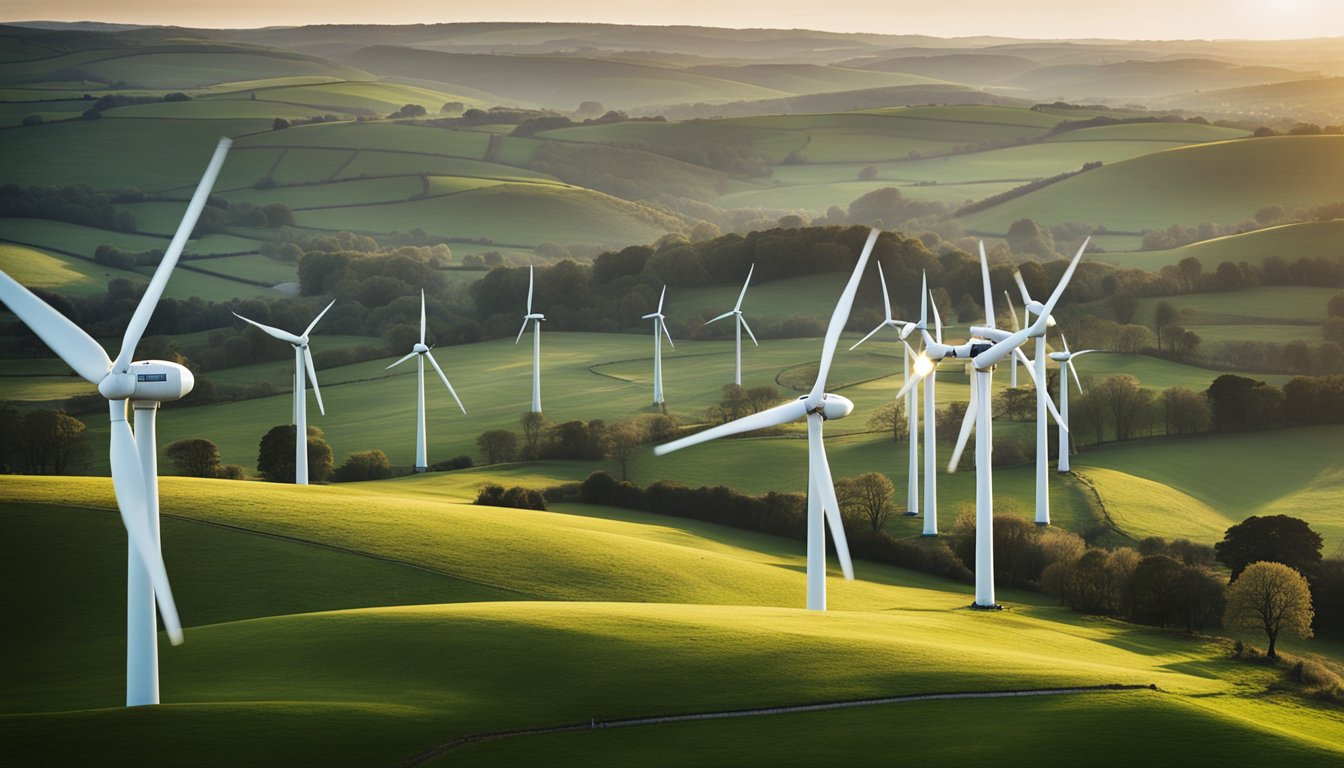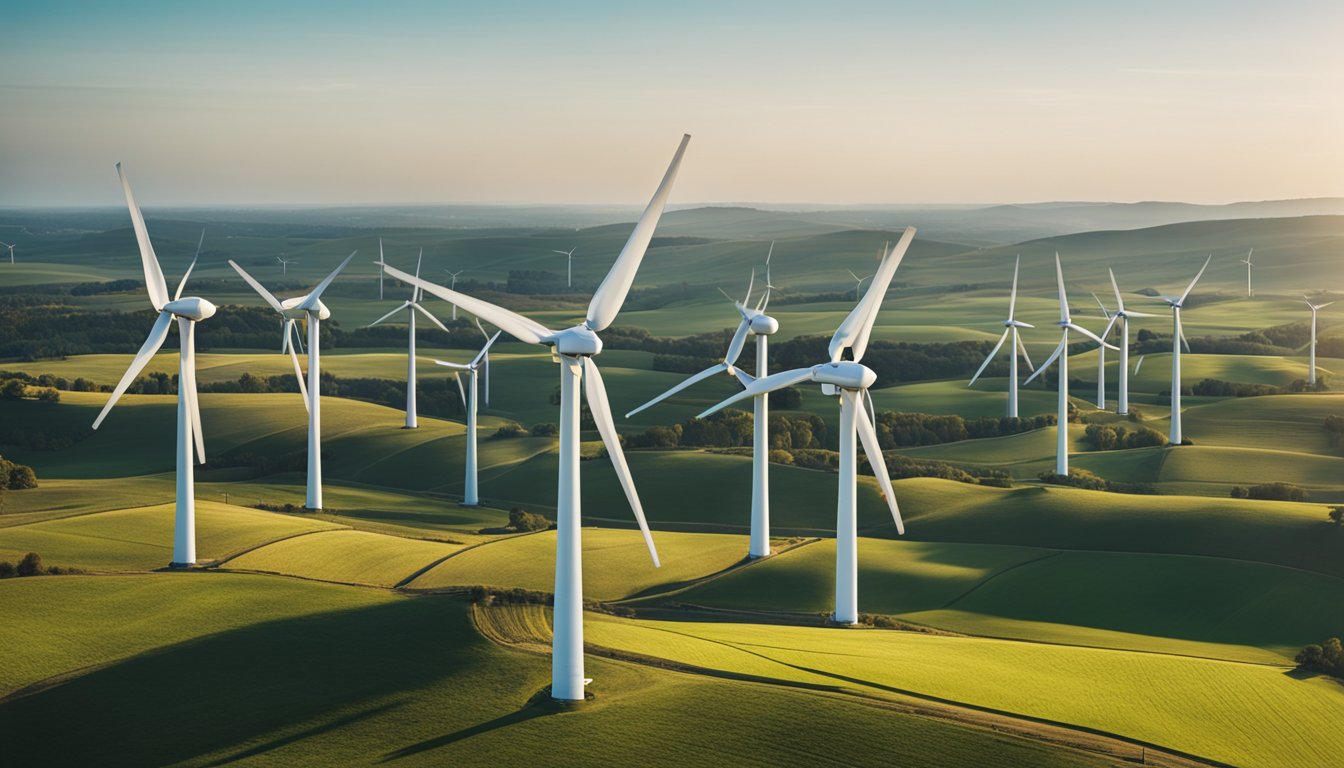Late updated: 01 Apr 2025 13:04
Written by: Eleanor Hartman
Emerging Trends In UK Renewable Energy Policies: A 2025 Perspective
The UK is at the forefront of a significant shift towards renewable energy, driven by a combined effort of policy innovation and technological progress. The transition from fossil fuels to a diverse mix of renewables is both promising and challenging. The UK government's ambitious policies set the nation on a path to becoming a leader in clean energy transformation.

Our energy landscape is evolving, not only in response to climate change but also through advances in technology. Offshore wind and solar power are leading the way, while newer solutions like green hydrogen and energy storage gain momentum. As these technologies develop, the potential for a more sustainable and efficient energy system increases.
As authors in this field, we aim to explore the emerging trends that are shaping energy policies in the UK and their implications for the future. Through a thorough analysis, we hope to shed light on the opportunities and challenges that lie ahead, engaging with the nuances of this critical transition.
Key Takeaways
- UK policies are pivotal in driving the renewable energy shift.
- Technological advances are crucial for energy efficiency.
- Emerging trends present both opportunities and challenges.
Policy Framework and Targets

In the United Kingdom, renewable energy policies play a pivotal role in steering the nation towards its decarbonisation goals. We explore how legislation, national strategies, and specific targets like net zero by 2050 shape this transition.
Legislation and Incentives
The UK government has enacted comprehensive legislation to promote renewable energy and reduce carbon emissions. The Climate Change Act 2008 is a cornerstone, mandating significant cuts in greenhouse gas emissions. Further, the Contracts for Difference (CfD) scheme encourages investment in low-carbon energy by subsidising electricity prices.
Additionally, the government provides incentives such as the Renewable Heat Incentive (RHI) and tax credits for clean energy projects. These measures aim to scale up renewable energy generation, fostering innovation and creating a robust market ecosystem. Ensuring energy security and lowering dependency on fossil fuels stand as policy priorities.
Net Zero by 2050
Achieving net zero by 2050 is at the heart of the UK's energy transformation agenda. This ambitious target drives policies across sectors. To meet these objectives, we focus on transitioning to low-carbon energy sources and minimising emissions.
The pathway involves comprehensive reforms, enhancing energy efficiency, and expanding use of renewables like wind, solar, and hydropower. Government data show increasing trends in renewable capacity and reduced emissions, aligning with international climate agreements. Monitoring frameworks ensure that progress is continually assessed against set benchmarks.
National Energy Strategy
The National Energy Strategy outlines Britain's roadmap for energy transition, aiming for a resilient and low-carbon system. The strategy includes measures to upgrade infrastructure and enhance grid capacity to handle diversified energy sources.
The National Energy System Operator (ESO) plays a crucial role in integrating various energy systems and ensuring stability. Further, the strategy emphasises collaboration with stakeholders, from industry players to local communities, to support clean energy initiatives. Focused investment in technology development and grid modernisation drives the nation towards its sustainable energy goals.
Technological Advances and Sectoral Developments

We are witnessing significant progress in the UK's renewable energy landscape. From offshore wind farms to cutting-edge energy storage solutions, these advancements are shaping our energy future. Hydrogen and electric vehicles play vital roles in this transition, helping drive sustainability and reduce carbon emissions.
Offshore Wind Integration
Offshore wind is becoming a cornerstone of our renewable energy strategy. The UK's investment in both fixed-bottom and floating offshore wind farms is reshaping energy generation. These technologies enable us to harness the robust winds in deeper waters, providing a large-scale, reliable energy source.
A key benefit of offshore wind is its ability to produce energy consistently, even when land-based sources are limited. Efforts to improve grid integration are crucial for balancing energy supply with demand. Nationally significant infrastructure projects play a role in enhancing connectivity and energy security. As technology advances, costs are decreasing, making offshore wind an increasingly attractive option for achieving our zero-carbon goals.
Hydrogen as an Energy Carrier
Hydrogen is emerging as a versatile energy solution. Its potential lies in its ability to store energy and serve as a low-carbon energy carrier. We are focusing on developing hydrogen production methods that utilise renewable energy sources, including wind and solar, to ensure sustainability.
Hydrogen's potential extends to sectors like transportation and domestic heating, aiding electrification efforts. It provides flexibility by enabling storage and subsequent release of energy as needed.
By integrating hydrogen technologies into the energy system, we can reduce carbon emissions across various applications. Our policy initiatives must focus on scaling up production and creating a resilient hydrogen infrastructure to support national and regional energy needs.
Energy Storage Solutions
Energy storage technologies are crucial for balancing supply and demand. Lithium-ion batteries are currently leading due to their high efficiency and scalability. These systems allow us to store excess energy generated from renewable sources, ensuring a stable power supply even during peak demand periods.
Going beyond lithium-ion, advanced technologies like gravity storage and thermal storage are being explored. These innovations promise longer duration storage with reduced dependence on critical minerals.
By investing in both small-scale and national storage projects, we enhance the flexibility and resilience of our electricity market. This approach helps us mitigate the intermittency challenges of renewable energy, ensuring a reliable and sustainable energy supply.
Electric Vehicles and Domestic Heating
The electrification of transport and domestic heating is crucial in reducing carbon emissions across the UK. Electric vehicles (EVs) are increasingly popular, supported by government incentives and expanding charging infrastructure. As vehicle battery technology improves, EVs become more cost-effective and capable of longer ranges.
In parallel, the shift to electric and heat pump-based domestic heating systems is transforming our energy consumption patterns. The adoption of smart grid technologies and energy-efficient infrastructure optimises energy use in homes.
Together, advancements in EVs and domestic heating reduce our reliance on traditional fuels, supporting cleaner air and sustainable urban environments. Our commitment to these technologies is central to meeting climate goals and ensuring a low-carbon future.
Frequently Asked Questions

In exploring the emerging trends within UK renewable energy policies, we focus on how various initiatives and targets are steering the sector. Our examination reveals the influence these policies have on production, energy mix projections, and alignment with broader directives.
How are UK renewable energy targets for 2030 influencing current policies?
The 2030 targets are propelling us towards increased investment in renewable infrastructure. Policies are tailored to meet these ambitious goals, driving the expansion of solar, wind, and other green technologies. Regulations have become more stringent, and incentives are promoting faster adoption rates.
What statistical trends in renewable energy production in the UK reflect policy impacts?
Recent data show a substantial rise in renewable energy capacity and generation. Solar and wind farm outputs have surged, thanks to targeted policy measures. Government actions have clearly contributed to this growth, indicating effective implementation strategies.
How is the UK energy mix projected to change by 2025 due to renewable policies?
Projections for 2025 suggest a significant shift towards a greater share of renewables in our energy mix. With policy backing, fossil fuels are expected to diminish while solar, wind, and other sustainable sources gain prominence. This transition is in line with our national carbon reduction commitments.
In what ways are UK renewable energy companies responding to government directives?
Companies are adapting by increasing investments in sustainable technologies and practices. Many are aligning their business models with government targets, seeking partnerships, and enhancing research and development efforts to meet the changing regulatory landscape.
What strategic developments in UK energy policies are directing the future of renewable resources?
Strategic policies are focusing on long-term sustainability and security of supply. Developments include enhanced grid infrastructure, support for innovations in energy storage, and policies to accelerate electrification. These moves are crucial for shaping the future of the UK’s renewable sector.
How do the latest UK renewable energy policies align with European renewable directives?
UK policies are generally in alignment with European directives, ensuring compliance with international targets. There is a concerted focus on integration with broader European energy networks, facilitating cooperation and shared progress towards collective goals.